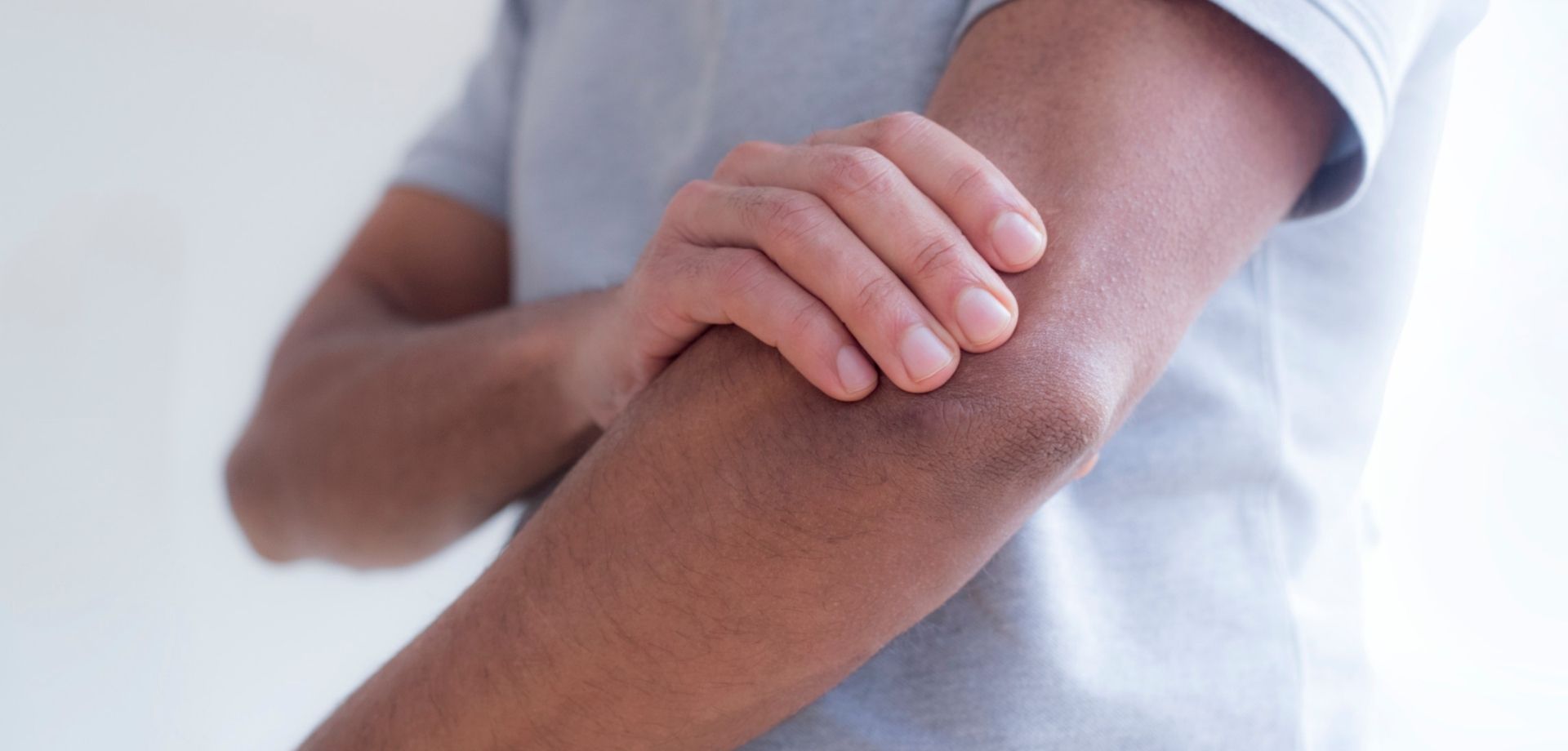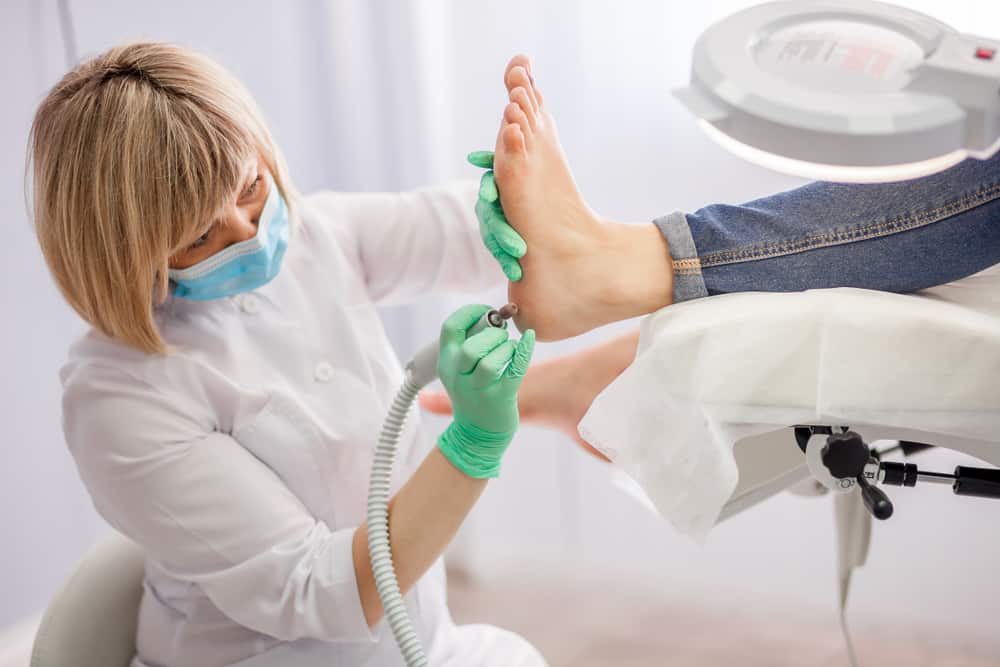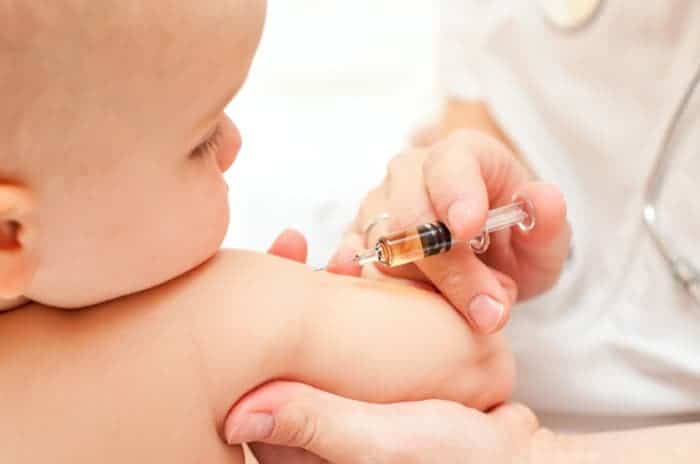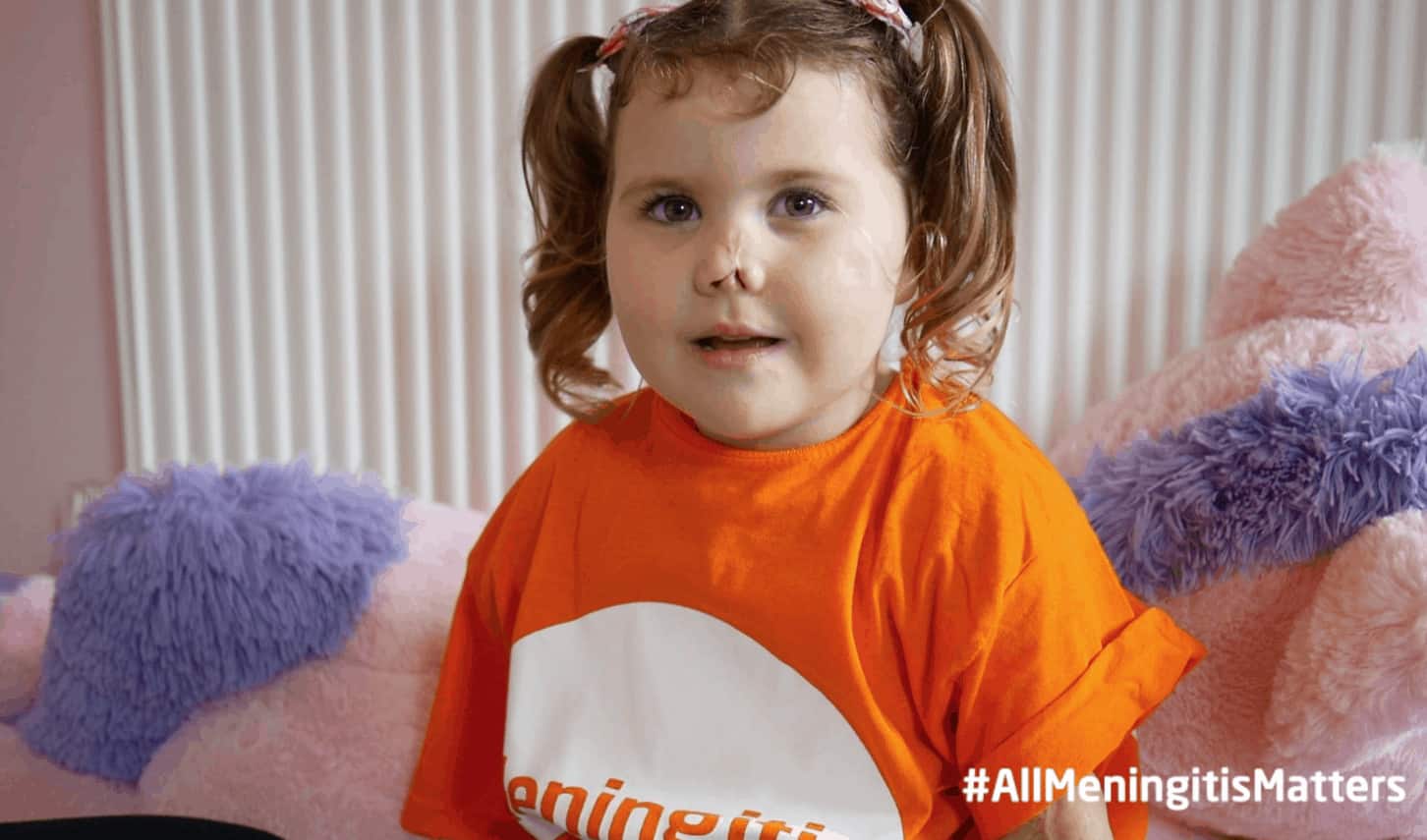Author: Lisa-Marie Ryan
With #Wimbledon in full swing again and everyone digging out their racquets in the beautiful sunshine, our osteopath, Andrew Doody, calls time on an old problem.
Tennis elbow is a condition that causes pain around the outside of the elbow. It’s clinically known as lateral epicondylitis and often occurs after strenuous overuse of the muscles and tendons of the forearm, near the elbow joint. You may notice pain: on the outside of your upper forearm, just below the bend of your elbow when lifting or bending your arm when gripping small objects, such as a pen when twisting your forearm, such as turning a door handle or opening a jar. You may also find it difficult to fully extend your arm.
The name tennis elbow is because the tennis backhand shot is a common way to develop the problem, however, any strain or overuse can cause it. The condition is easy to get but can hang around for weeks and months if left untreated. This is largely due to the fact that lots of the muscles in the hand and forearm attach to either side of the elbow. This means that once the area is inflamed, almost everything you do with the hand can re-aggravate it, from drinking a cup of tea (or Pimms) to opening a door (or raising a trophy).
Once diagnosed, treatment involves firstly reducing the inflammation with rest, cold compresses and medication, followed by massage and careful mobilisation to help relieve pain and stiffness and restore the range of movement. Specific supports can also be quite beneficial at this time. Preventing tennis elbow Preventing tennis elbow is tough but here are a few pointers: If you have tennis elbow, stop doing the activity that is causing pain, or find an alternative way of doing it that does not place stress on your tendons. Avoid using your wrist and elbow more than the rest of your arm. Spread the load to the larger muscles of your shoulder and upper arm. If you play a sport that involves repetitive movements, such as tennis or squash, getting some coaching advice to help improve your technique may help you avoid getting tennis elbow.
Before playing a sport that involves repetitive arm movements, warm up properly and gently stretch your arm muscles to help avoid injury. Use lightweight tools or racquets and enlarge their grip size to help you avoid putting excess strain on your tendons. Wear a tennis elbow support when you are using your arm, and take it off while you are resting or sleeping to help prevent further damage to your tendons. Ask your GP or osteopath for advice about the best type of brace or splint to use. Increasing the strength of your forearm muscles can help prevent tennis elbow. An osteopath can advise you about exercises to build up your forearm muscles.
If you think you might be suffering from tennis elbow and are seeking treatment or advice, you can book an osteopathy appointment online.
- We have a small, friendly team of specialists, who are all HCPC registered professionals, with a broad range of skills and experience.
- We take a team approach to care: our podiatrists work together with our in-house osteopath, GPs, acupuncturist and dietician to give you the best support for your foot health problems.
- We have an excellent network of trusted colleagues to whom we can refer, with expertise in dermatology, physiotherapy, radiography, sports medicine and surgery.
- We will look after your foot-health at a time convenient to you – day and evening appointments always available!
- We stock a range of professional foot-care products to help you to get the best out of self-care between appointments.
Book your Podiatry appointment today. Or find out more about our podiatry clinic here.
5 excellent ways the Fleet St, Clinic’s occupational health services can benefit employee health and well being:
- Recruiting a new employee? Arrange a pre-placement assessment.
Why? The OH nurse or doctor can check whether the employee is fit to undertake the role. If any health concerns are identified, s/he can make recommendations, where appropriate, to promote the employee’s well being and health at work. - Staff reporting back problems? Arrange an ergonomic assessment.
Why? It could be that your employee’s workplace arrangement is causing or contributing to the problem. Our ergonomics consultant can assess their workplace in relation to the problem(s) reported/diagnosed and provide advice and recommendations on how to reduce symptoms. - A staff member returning to work after illness? Arrange a Fitness Assessment.
Why? Employees and employers can benefit from advice and recommendations on how best for the employee to enter back into work to minimise risk of relapse and aid a successful and healthy return to work. - Assigning one of your employees to a project abroad? Arrange a pre-deployment medical.
Why? Depending on the assignment and location, working abroad can increase stresses on the individual and often with limited access to medical care. A pre-deployment medical can assess whether the employee is fit to undertake the post, provide advice and recommendations to promote their health while away and advise on any travel precautions to prevent illness.
You can find out more about our occupational health services here.
Alternatively, fill out the form below and we’ll propose suitable services for your consideration.
The Zika Virus has been making headlines recently for it’s frightening links to rare birth defects. Brazil has even gone as far as to warn women to avoid falling pregnant whilst an epidemic is rife. The link between 400 cases of new-borns with microcephaly in the north-east of Brazil is being investigate by health authorities.
The increase in microcephaly, a neurological disorder that stunts the growth of the baby’s cranium, limiting it to a circumference of less than 33cm, has increased in Brazil from 59 cases in 2014, rising to 1,248 cases throughout 2015. Typically, life expectancy for babies born with the condition is reduced. In 90% of cases, brain function is also reduced. There are currently no travel restrictions in affected areas.
How is the virus contracted?
The Zika virus is spread to people through the bite of an infected mosquito. Outbreaks have been seen across Africa, Asia, Central and South America.
What are the the symptoms and treatment?
The common symptoms, usually mild and often lasting from a few days to one week, can be a rash, fever, joint pain, and conjunctivitis. There is currently no vaccine to prevent or medicine to treat the virus. Pain killers can be used to alleviate these symptoms which often go mistaken as a fever, and can easily be missed, especially in the early stages of pregnancy.
Is there a way to reduce my risk?
Insect bite precautions is paramount, especially for pregnant women in the affected areas. The NHS travel website, Fit For Travel, recommends:
- Covering up – wearing long sleeved tops and long trousers
- Spraying thinner clothing with insect repellent
- Burning pyrethroid coils and heating insecticide impregnated tablets
- Sleeping in a screened room where possible or using a treated mosquito net
If you are travelling to Brazil or any of the infected areas, book an appointment with one of our dedicated Travel Clinic nurses for information on vaccines and travel wellbeing now on 020 7353 5678.
Zika Virus – Additional Resources
Zika virus: medical advice for travellers – The Telegraph – Richard Dawood
Zika Virus – Video
Watch Fleet Street Clinic’s Dr Richard Dawood discuss Zika Virus on Victoria Derbyshire.
Do you often find yourself trawling through Instagram just before going to bed? Waking up and checking your emails before you even have a shower or a coffee? Former Facebook chief marketing officer Randi Zuckerberg hit the nail on the head when she said that people need to understand that while “the phone is an amazing tool, we own our devices, they don’t own us.” It’s time for your digital detox.
The average smartphone user checks their phone 221 times a day. The Oxford English Dictionary defines a digital detox as “a period of time during which a person refrains from using electronic devices such as smartphones or computers, regarded as an opportunity to reduce stress or focus on social interaction in the physical world.”
By periodically unplugging, you can start reclaiming real life experiences rather than living in a virtual world. So how can we get this started?
Appreciate the silence – We have become so accustomed to filling every spare moment with digital noise. Try hitting reset on your brain from time to time and take a few moments to just let your mind wander. Be comfortable with silence, slow down and be present in the moment without the glow of a screen.
Kick technology out of the bedroom – Give yourself a technology curfew and when you say “lights out” actually mean it. Harvard researchers have found that technological devices such as phones, tablets and laptops can disrupt melatonin production, sleep quality and mood. To avoid temptation, banish your devices from the bedroom and try using an old fashioned alarm clock!
Socialise in the real world – Let’s face it, how many of the people you follow on your social media are actually your close friends? At 1am when you are struggling to sleep, do you really need to look at pictures of what they ate for lunch? Whilst social media can have its uses and be a positive influence, it can have a negative effect on our wellbeing as a result of comparing our lives to those carefully edited for show.
Hit the pause button – Be conscious of how often you check your phone – next time you go to reach for technology, hit the metaphorical pause button. Take a breath and think about what you are going to get out of it. Is there a more meaningful and productive way to spend your time, such as going for a walk and getting some fresh air and movement instead?
We get 525,600 precious minutes a year, how you choose to spend them is up to you.
“If it doesn’t add to your life it doesn’t belong in your life”
Speak to our occupational health experts for advice on how to take a digital detox today on 020 7353 5678.
World Malaria Day
Reaching the zero Malaria target
How You can Prevent Malaria
- Using antimalarial medication
- Spraying indoor walls and your clothing with insecticides
- Using insecticide-treated nets and window screens
- Wear light-coloured, long sleeve clothing
- Get rid of any stagnant water
Since 2017, the World Health Organization has supported a group of 21 malaria-eliminating countries through a special initiative called the “E-2020”. This report charts their progress towards a common goal: eliminating malaria within the 2020 timeline. According to this report, 8 E-2020 member countries reported zero indigenous cases of malaria in 2020, a remarkable achievement in view of the ongoing global COVID-19 pandemic. Maintaining zero cases is a testament to their commitment to protect hard-won gains and keep the disease at bay. You can find more on this report here.
More Information
Read more about malaria and how to you can prevent it.
For further information and a consultation with an experienced member of our travel team, you can book an appointment online here.
Meningitis Now Offers Advice for World Meningitis Day, to spread the word about meningitis, how to spot it and what causes it, as well as the importance of vaccines.
The theme for World Meningitis Day 2018 is #AllMeningitisMatters.
There are several different causes of meningitis and vaccines can help protect against certain strains of bacterial and viral meningitis.
The key messages for this year are:
- Meningitis is a potentially deadly disease that can kill within 24 hours.
- Bacterial meningitis can be caused by many different types of bacteria.
- There are safe and effective vaccines that protect against the most common causes of bacterial and viral meningitis.
- Not all strains of meningitis are vaccine preventable, so being able to recognise the symptoms is crucial.
Measles on the rise:
The World Health Organisation (WHO), has reported that measles cases are on the rise worldwide and in Europe alone, outbreaks have surged to a 20-year high.
The WHO states that reported measles cases (provided by each country) currently show that about 229,000 cases have already been reported, compared with 170,000 for 2017. Worryingly the 2018 number is likely to rise as the reporting deadline ends April ’19.
With a 50% increase in measles cases last year, it is important to understand the benefits of vaccinating against measles:
Dr Richard Dawood, our Medical Director explains;
“I recently heard about a patient suffering a bad attack of shingles. She didn’t believe in doctors, medicines or vaccines, I was told, and was languishing at home, with a dreadful, crusted rash across her body, and burning with pain. She had stuck to her beliefs and refused to take antiviral medication that could have aborted the attack or reduced the probability of ending up with long term nerve damage and lingering pain. Shingles can strike more than once, but since she doesn’t believe in vaccines (there is a good one that is 95% effective) she will have to take her chances of a recurrence in future. I disagree with her opinions, but her latest actions will harm nobody but herself.
But measles is different: when it comes to vaccination, personal choices and opinions have a direct impact on the health and wellbeing of others – individually as well as for entire communities. Measles vaccination is a major public health issue. Memories of the past outbreaks, epidemics, tragic disability and loss of life that drove research and ground-breaking vaccine development now belong to a previous generation. In these days of “fake news”, “influencers” and social networks, it has become too easy to undermine confidence in matters of public health. In the case of measles, concerns about vaccine safety are down to the “fake research” of Andrew Wakefield, who was struck off the medical register for concocting a spurious link with autism in the 1990s. But the damage was long-lasting.
The complications of measles are most severe in babies who are not yet old enough to be vaccinated, and children with reduced immunity. When the rate of vaccination in the general population falls below 95%, outbreaks occur and can easily spread, with the highest impact on those most vulnerable populations, undermining years of hard work around the world to bring measles under control.
That is what is happening now”.
VACCINATION AGAINST MEASLES
‘The highly contagious disease can cause severe diarrhoea, pneumonia and vision loss. It can be fatal in some cases and remains an important cause of death among young children”, according to the WHO.
The disease can be easily prevented with two doses of a safe and efficient vaccine that has been in use since the 1960s’.
Make sure you are up-to-date with your vaccinations including the measles, mumps and rubella (MMR) vaccine. Although the NHS immunisation schedule offers the vaccine to children from 12 months of age, the MMR can be given from 6 months. If you have not had measles or if you have not had two doses of MMR, you may be at risk. Measles is easily passed from person to person and can be a serious illness in adults as well as children. It is never too late to have the vaccine.
Just back from….Cape Verde
Out travel clinic nurse Anna has just returned from the beautiful islands of Cape Verde. At Fleet Street Clinic, we’re seeing increasing numbers of people who are planning to travel to this area, known for its stunning beaches and Creole Portuguese-African culture.
Anna said “The highlights of my trip were definitely walking through the lunar-like landscapes on the Serra Malagueta on Sao Tiago Island, seeing humpback whales and dolphins off the coast of Maio Island and the windswept beaches of Porto Ingles, Maio”.
Are you planning a trip to Cape Verde? Here’s what you should remember before you go:
Vaccinations
Ensure your vaccinations are up-to-date. Here is a list of recommended vaccinations travellers should consider.
Insects
Whilst Cape Verde islands are over 400 miles away from mainland Africa. Both the Aedes and Anopheles mosquito have found a home there, bringing the risk of viral infections such as dengue fever and Zika virus. Late 2017 there had also been reports of malaria cases in the capital Praia, Santiago Island. Whilst the risk to travellers is low, it is essential to avoid mosquito bites by covering up with long loose clothing and using insect repellent with DEET.
Sun
Cape Verde lies within the tropics which means the suns rays are incredibly strong. The main allure of this country is its long sandy beaches and crystal clear waters which can pose a risk of sunburn and heat-related illness. Ensure you apply a high factor sunscreen, avoid direct sunlight between the hours of 11am-3pm whilst at it’s strongest and stay hydrated to reduce the risk of heat-related illnesses.
Watersports
Cape Verde is popular with water sports enthusiasts, especially surfers, windsurfers and divers. The warm sea temperatures mean that any cuts and scrapes can become easily infected, so taking minor first aid items such as antiseptic and plasters should be taken to treat any injuries promptly.
Those who are undertaking water sports should consider wearing sunglasses with polarised lenses to help reduce the glare from the water.
Those who are prone to ear infections can consider taking an ear spray to reduce the risk. All travellers should ensure that their travel insurance policy covers such activities.
Thinking about polarised sunglasses? Come along to our Maui Jim event at Whitby and Co on Friday to find out more.
First aid Kit
Cape Verde is made up of 10 islands, and inter-island transport often involves a flying. Apart from the capital Praia, many islands have limited shops and pharmacies. Therefore if you become sick whilst away, obtaining medications to treat minor illnesses and injuries can be difficult. It is best to be self-sufficient. If you take prescription medication, ensure you pack enough to last you your trip, and take the prescription with you. Taking medications such as painkillers, antihistamine and medication for an upset stomach is also sensible as mild illnesses can often ruin a holiday and simple medication may not be readily available. Fleet Street Medical Kits contain everything you need.
Travelling soon?
If you’re planning to travel to Cape Verde or elsewhere and you’re unsure about the health precautions you should be taking, talk to us at Fleet Street Clinic, your travel health experts in central London. You can book an appointment online.
RIO CARNIVAL
Rio carnival is a huge pull for travellers heading to Brazil. With over 2 million people attending, it is the biggest carnival in the world, and probably the most colourful!
If you’re lucky enough to be going to the carnival this year, you’ll get the most out of the experience if you prepare beforehand and have a worry-free trip! Here are our top travel health tips to read before you go.
RECOMMENDED VACCINATIONS
Yellow Fever:
- There have been outbreaks of Yellow Fever in Brazil, including the city of Rio de Janeiro. We advise all travellers that are heading to Rio to ensure that they have received a yellow fever vaccination 10 days prior to travel to ensure they are fully protected.
- Yellow Fever vaccination is highly recommended for certain areas of Brazil, including the cities of Manaus, Belo Horizonte, Cuiaba, and Brasilia
- There is a high risk of Yellow Fever in the Amazon and in Iguazu Falls, so if you plan to do any onward travel after carnival we recommend obtaining the vaccination
- If you are planning to travel to other areas of South America before or after the trip, you may be required to have the Yellow Fever vaccination, and hold proof in the form of an International Certificate of Prophylaxis
Hepatitis A is a viral infection spread via contaminated food and water. A first dose of the vaccination protects for a year, a second dose given 6 months later protects for 25 years+
Typhoid is a bacterial infection through contaminated food and water(gives 3 years protection)
Tetanus, Diphtheria, Polio is a routine immunization given in childhood, but travellers should ensure they have received a dose of the vaccination in the previous 10 years
Measles, Mumps, Rubella – make sure you have received a primary course of MMR vaccinations (usually given in childhood) and unimmunised adults should receive their vaccine
OTHER VACCINES TO CONSIDER
Rabies – Travellers should be aware that Brazil is a high-risk country for Rabies and an intermediate risk country for Hepatitis B and those considering visits to remote regions or for prolonged visits may wish to be vaccinated; especially as urgent Rabies treatment can often be difficult to obtain in certain areas.
Malaria – a parasitic infection that is spread via mosquitos that are most active between dusk and dawn. It occurs in the Amazon region and the northeast of the country, and malaria prophylaxis is strongly recommended if visiting these regions or if going to Manaus.
MOSQUITO PRECAUTIONS
Dengue Fever, Chikungunya Fever and Zika virus can occur throughout all of Brazil. Brazil These viruses are spread by mosquitos that are most active during daylight hours. There is currently no vaccination or preventative medication for such illnesses.
Minimising insect bites that can transmit disease is essential. This involves covering up with clothing and ensuring insect repellent that contains a minimum of 50% DEET is worn to prevent mosquito bites. Using plug-in vaporisers in rooms to reduce mosquitoes and sleeping under bed nets will help.
Our Ultimate Bug Kit contains everything you need to keep mosquitos at bay.
ZIKA
Zika virus is especially serious in those individuals who are pregnant or planning to become pregnant at the time of travel. As Zika is an emerging virus, it is essential to keep informed with the most up-to-date advice. We are able to offer Zika testing and counselling if you have concerns about Zika virus.
HEAT
The average temperature in Rio in February is 29 degrees. This means that both heat and sun protection is required. This means avoiding direct sunlight between 11-3pm and seeking shade and wearing a sun cream with a high SPF to prevent burning.
HYGIENE
Often travelling to different countries can result in travellers’ diarrhoea, which can be caused by bacteria, viruses or parasites. It is important to practice safe food and hygiene practices such as:
- Washing hand thoroughly with soap and water or alcohol gel before food consumption
- Ensuring drinking water is safe by avoiding ice, drinking bottled water or having a reliable method of water purification (such as filtering or chemical sterilisation)
- Ensuring food is well cooked and served hot. Avoid salads or fruit that may have been washed in unsafe water
- All travellers should take medications with them to treat travellers’ diarrhoea. This can include rehydration salts, anti-diarrhoeal medication and even antibiotic treatment – see our Worldwide Gastro Kit.
FLEET STREET CLINIC
For more advice from our expert travel team on safe travels in Brazil, book a travel consultation appointment.
By Anna Chapman | Travel Nurse | February 2018
Staying Healthy on the Slopes
Ski season is upon us, and it’s time to prepare yourself physically for your adventures on the slopes!
Skiing once a year can easily lead to injury – no surprise for such an intense activity, involving a range of muscle groups. And it’s not just skiing that’s physical; lifting skis, boots and using lifts can all take their toll on your body! In order to stay healthy this ski season, a little preparation is all that’s required.
Our Consultant Osteopath, Andrew Doody BSc (Hons), gives advice on how to avoid injuries so that you enjoy your holiday on the slopes.
Before your holiday:
- Build up your fitness gradually – walking quickly to work or weekend sessions on a cross-trainer will help you to prepare your muscles
- Start a stretching programme. Concentrate on quads, hamstrings and calves
- Don’t ignore any twinges you have – get yourself checked out by a professional before you travel
- Work on your balance – yoga postures will help
- Check your alignment; most skiers find turning one way easier than the other, which may be caused by either one-sidedness or muscle weakness
- Get professional advice on the best products to support a problem back, knees, ankles, or wrists
On the Slopes and Après Ski
- Ensure ski-boots are properly fitted. Ill-fitting boots can impact on your posture when skiing
- Warm up before you start and stop to stretch, especially at the end of the day
- Make sure to keep hydrated – easy to forget in the cold weather
- Beware when you’re walking with you ski gear! Lots of ski injuries come from carrying kit badly or slipping on ice away from the slopes
On Your Return
- Consider ways to improve your fitness level throughout the year and be well prepared for the 2018 season
- If you have any lasting pains, make sure to have a professional health check
Book an Appointment at Fleet Street Clinic
Want more professional support and advice before your ski trip?
Book an appointment to see Fleet Street Clinic’s Consultant Osteopath Andrew online.
The HPV Vaccine, Gardasil 9, is back in stock at Fleet Street Clinic.
The vaccine is available to men and women. It protects against a range of cancers including cervical, head and neck cancer and other HPV-related diseases including genital warts.
5 facts about the HPV (Human papillomavirus) :
- Nearly all cases of cervical and anal cancer and 70% of oropharyngeal cancers are related to HPV.
- HPV is one of the most common sexually-transmitted diseases, so common in fact that most sexually active men and women will have HPV at some point in their life.
- There are different strains of the virus and they can be categorised into low-risk and high-risk HPV.
- There is no cure for HPV; some people fight off the virus without any knowledge of having been infected, whilst the virus can lie dormant in others, remaining undetected for many years.
- The virus can eventually cause abnormal cell growth – cervical abnormalities in women, which is why regular cervical screening is so important.
In order to protect against the virus, the HPV vaccine is strongly recommended. For more information, visit our HPV Vaccine page.
BOOKING A Vaccination APPOINTMENT
You can book an HPV appointment online.
Fleet Street Clinic is delighted to be attending the Adventure Travel Show at Olympia in London, Saturday 20 – Sunday 21st January 2018.
Our travel nurses Anna and Leigh-Ann will be on Stand E19 to share their travel expertise, offer travel advice and health guidance to help you get in great shape for your next trip.
Come along to meet us and receive special prizes and discounts. Follow us on Twitter and Instagram for live updates from the show.
Adventure Travel Show
The Adventure Travel Show is dedicated to travel enthusiasts who want to take a trip off the beaten track.
With a range of specialist adventure travel companies exhibiting and informative talks from experts, including explorer Ranulph Fiennes, the event is sure to inspire you before your next travel adventure!
Save 15% on admission
To get your exclusive discount code for The Adventure Travel Show and save 15% on admission, please email info@fleetstreetclinic.com. You receive an email with your code and a link to buy the tickets.
The New Year is a time for reflection, resolutions, and making a fresh start.
At Fleet Street Clinic, we want our patients to start the year in good shape, by offering a New Year “Top to Toe” special and 10% off selected health screens throughout January.
1. “Top to Toe” New Year special – £333*
This includes 3 treatments: a Standard Well Man/Well Woman Medical, and choose two of the following:
(* Denotes a standard 30 minute appointment)
2. January Savings
Fleet Street Clinic is offering a 10% discount on:
- Medicals (includes comprehensive medicals and standard Well Man and Well Woman medicals)
- Sexual Health screens
For bookings, please contact us on 0207 353 5678, email info@fleetstreetclinic.com or book an appointment online.
Each medical includes GP Consultation, full medical history and physical examination, Blood Pressure, BMI, coronary risk score, urinalysis, blood tests (including cholesterol levels, liver & kidney functions, diabetes screen). The Well Woman medical includes a cervical smear.
*Pricing is subject to change, this expired 31st January 2018.
January is here and with it comes a fresh New Year, a good time to shed any extra weight gained over the party season. Sadly, despite all the ‘quick fix’ diets, and a variety of diet pills on offer that promise you will ‘drop ten sizes in ten days’, there is no miracle cure.
WHAT IS A FAD DIET?
A fad diet is normally endorsed by a celebrity of some sort and or a non-healthcare professional and will usually cut out one or more food groups. What will usually happen is that you try the fad diet and lose weight very quickly. So what’s the catch? You’ll inevitably get bored as the diet will be unsustainable, and then return to your normal eating habits and put all the weight back on and more.
HOW TO SPOT A FAD DIET
Does your new diet:
- Cut out major food groups such as wheat, dairy or yeast?
- Promise you’ll lose more than 2lbs a week?
- Seem very restrictive and hard to follow?
- Require that you buy special expensive foods to follow it?
- Tell you the reason you ‘can’t lose weight’ is probably a food allergy?
- Provide no clinical evidence?
- Promises to be the answer to all your problems?
Yes to any of the above? It’s a fad.
Be aware of who is offering advice:
There are many people out in the world today promoting all sorts of diets to help you feel great and lose weight, however many of them are not medically trained.
Be aware of practitioners who use tests such as:
- Blood tests, especially those that mix your blood with food.
- Hair mineral analysis to tell you what you should eat.
- Stool analysis.
- Looking in your eyes to tell you what diet to follow.
- Kinesiology.
- Face reading.
None of these have any clinical evidence that they can help with weight or any other nutritional issues.
BUT I STILL WANT TO LOSE THOSE EXTRA POUNDS… think of the phrase ‘eat half, walk double’!
Let’s go back to basics:
- Have three, balanced meals spread out throughout the day.
- Eat the three meals in a 12 hour time frame.
- Have 5 portions of fresh fruits (2-3 portions) and vegetables (2-3 portions) daily.
- Include two portions of protein daily – tofu, beans, lentils, soy, chicken, eggs, fish.
- Balance out your meals. Lunch and supper should be half a plate of vegetables, a quarter protein and a quarter carbohydrates.
- Get in 30 minutes of exercise daily. Cycle to work, go for a walk on your lunch break – get moving!
- Avoid snacks that are high in processed sugar or fats like nuts, crisps, biscuits cakes, chocolates. Replace your cravings with fruit and vegetables but keep fruit to a maximum of three times a day. Even fruit has high levels of sugar.
- Keep hydrated – most people require two litres of water per day.
Want Help With Your Eating Plan?
If you’d like more support from a professional, you can book an appointment with Dietitian Ruth Kander for some much needed January motivation.
FLU SEASON 2017
Following particularly bad flu seasons in Australia, New Zealand, and Asia, the NHS has been told to prepare for a severe winter flu epidemic, the BBC reported today.
The Chief Executive of the NHS Simon Stevens said,
“The signs from Australia and New Zealand, who are just coming out of their winter, are that it has been a heavy flu season and many of the hospitals down there have struggled to cope.”
Research indicates that health services in Australia and New Zealand are recording double the amount of cases of flu this winter, compared to the average of the previous 5 years.
Every year, a few different strains of flu circulate and one normally becomes dominant. In Australia and New Zealand, the H3N2 strain has been the main problem. The good news is, that if the UK flu season follows the same pattern, the vaccine produced for Winter Flu 2017/ 18 is effective against this strain.
Source: The BBC
Flu Vaccinations at FluJabs.Org – the flu vaccination programme from Fleet Street Clinic
Fleet Street Clinic offers a flu vaccination service for businesses and individuals between September 2017 and February 2018. Adults and children are welcome at our Fleet Street Flu Jabs drop-clinic. Flu Jabs are offered on a walk-in basis (to attend at a specific time, please book an appointment with a doctor or nurse, a separate appointment fee applies).
WHEN IS THE DROP-IN FLU CLINIC OPEN?
Our service runs Monday through Friday 9am – 5pm. (PLEASE NOTE: these hours are shorter than those offered for other services at Fleet Street Clinic). Book your appointment today.
If you have any further questions about the flu jab or other travel vaccinations, our experienced team of nurses can help.
Asthma – affecting millions around the globe
Today is World Asthma Day. Asthma is a very common respiratory condition, with 300 million people affected globally. And the numbers of asthma sufferers is increasing each year.
At Fleet Street Clinic we deal with asthma-related complaints on a regular basis and stock medication for dealing with symptoms.
What is Asthma?
Asthma is caused by inflammation in the airways, which narrow and can become blocked with mucus, leading to breathing difficulties.
Some may grow out of asthma, whilst others will have to manage the condition for life.
Asthma sufferers may notice wheezing, coughing, breathlessness and a tight chest. Severe symptoms may leave sufferers struggling to breathe which results in an asthma attack.
Treatment can be provided with inhalers and various steps can be taken to deal with asthma triggers to lessen symptoms.

Managing Your Asthma
Managing your asthma is very important to maintaining your health. Keep a diary of asthma flare-ups to see if you notice any particular triggers and visit your doctor regularly for check-ups. If your symptoms worsen, make sure to seek medical help without delay.
Travel and Asthma
If you are travelling, make sure to check you have the medication necessary for your trip. Remember hayfever seasons can vary around the world. Fleet Street Clinic stock necessary medication to cover any last-minute requirements.
If you think you may have asthma, book a GP appointment today.
The Fleet Street Clinic is committed to keeping journalists safe and well in high risk environments abroad.
The aim of this seminar is to provide a briefing for newsgatherers on the current crisis in West Africa, plus a hands-on training in biohazard protection.
Frontline Club, 13 Norfolk Place, London W2 1QJ
Thursday 2nd October 2014
9:30 – 14:30
The current outbreak of Ebola virus disease is unprecedented in scale and severity. The affected countries of West Africa do not have the resources or the public health infrastructure necessary to bring the outbreak under control, and massive external intervention will be needed. How long might it continue? How will it be covered as a news story? Will the need for news put newsgatherers at risk, and if so, how can risks be minimised? How should Ebola be reported upon? What impact is news reporting having upon the regional economy, and the global response?
These are some of the questions we hope to address in a special seminar aimed at print and broadcast media: bureaux chiefs, health & safety managers, and frontline news crew themselves, with a briefing from an internationally renowned expert in the field, and a practical, hands-on training session conducted by an expert in biohazard protection.
The event is free to attend, but places are limited, so please let us know if you would like to attend.
Programme
| 9:30 | Coffee, registration | |
| 10:00 | Ebola: background and analysis of the current West African outbreak | Prof David Heymann |
| 10:45 | Q&A / Discussion | |
| 11:15 | Coffee break | |
| 11:30 | Protecting News Media Personnel in a High Risk Environment: Introduction | Dr Richard Dawood |
| 11:45 | Biohazards: Principles of Personal Protection | Ian Samson |
| 12:15 | Lunch | |
| 12:45 | Biohazards: Personal Protection – Practical session | Ian Samson |
| 14:30 | Finish |
Speakers:
Professor David Heymann, CBE
David is Professor of Infectious Disease Epidemiology, London School of Hygiene and Tropical Medicine; head of the Centre on Global Health Security at Chatham House, London; and chairman of Public Health England, UK. He has frontline experience of working with Ebola in Africa, having personally investigated some of the original outbreaks in central Africa going back to 1976. He is actively involved in the current international response.
Ian Samson
Ian is the EMEA Regional Training Specialist for DuPont Personal Protection. DuPont is currently supplying personal protective equipment to the WHO, MSF and other public health and aid agencies, including tens of thousands of coveralls. Ian’s expertise in this field is well known, and he has previously trained news media personnel during other public health emergencies, such as during news coverage of avian flu in Asia, in 2005/6.
Dr Richard Dawood
Richard is the medical director of the Fleet Street Clinic, a specialist in Travel Medicine, and a consultant to several news media organisations.
Personal Protective equipment will be available for delegate training, supplied by courtesy of DuPont and CES Ltd.
Recent media reports have raised awareness of the effects of Meningitis B and the importance of the meningitis vaccine (if your child is aged under 12 months, the vaccine still readily available via your NHS doctor). Less well-known is the fact that there are different strains of Meningitis, with different vaccines protecting against them. Some of the recent cases reported in the media have actually been caused by Meningitis W or Meningitis C rather than the B strain, and it is important to know that vaccine protection is still widely available against those strains.
Strains and Meningitis Vaccines:
- Meningitis B: the protective single-strain meningitis B vaccine is Bexsero
- Meningitis A C W Y: the 4-strain vaccines Menveo and Nimenrix offer protection.
Meningococcal Meningitis and its Symptoms
Meningococcal meningitis is a bacterial infection that causes inflammation of the protective membranes surrounding the brain and spinal cord. It can affect people of any age, but those most commonly affected are children under 5, and teenagers and young adults heading off to university.
Initial symptoms may be similar to flu, progressing to:
- A high temperature/fever, with cold hands and feet
- Vomiting
- Refusal to eat
- Drowsiness
- Floppy and unresponsive
- Rapid breathing
- Neck stiffness
- Bright light sensitivity
- Pale, blotchy skin, and a red rash that doesn’t fade when a glass is rolled over it
- Convulsions or seizures
Further information: https://www.meningitisnow.org/meningitis-explained/
The specialists at the Fleet Street Clinic recommend getting your children vaccinated not just against Meningitis B, but against Meningitis A,C,W & Y strains as well (the vaccine is currently available and in stock).
Meningitis B Vaccines Availability
We currently do have a limited supply of Meningitis B vaccine, available on a first come, first served basis. You can book a Meningitis B vaccination appointment online.
Will you be traveling to Rio de Janeiro to attend or work on the Rio 2016 Olympics and Paralympics games? It is a common phenomenon for people to focus heavily on attending or working at the Olympics – then having to spend much of their time seeking medical care, having to leave early, or even be hospitalised, for a problem that should have been resolved prior to travel.
Take a moment to review our travel health checklist for Rio 2016 to help keep you enjoying your time at the games!
Before you go:
>>Come and see us four weeks before you depart – don’t forget to bring along a record of any past vaccines you have received.
1. Vaccinations
Routine vaccines should be up to date.
- Diphtheria/Tetanus/Polio (within past 10 years)
- MMR
- Possibly pneumococcal vaccine for adults aged over 65
- Chickenpox (varicella) – CDC recommended as these are routine immunisations is USA
- Whooping Cough (Pertussis) – CDC recommended as these are routine immunisations is USA
Travel vaccines: The following travel vaccines may also be recommended for your trip:
- Hepatitis A
- Typhoid
- Hepatitis B –
- Yellow fever (certificate NOT required for entry – may be required by other countries for onward travel)
- Rabies
- Flu (Southern hemisphere strains – ask us for details)
While you are there:
2. Insect-borne diseases
Dengue, chikungunya and Zika are mosquito-borne virus infections that cause rash, fever, joint and muscle aches, and eye pain or conjunctivitis.
Malaria
Rio de Janeiro is malaria-free, with no risk of yellow fever at present.
If you will be travelling to the Amazon basin or other places in South America that have a risk of malaria, you may need to take preventive medication.
Preventing insect-borne diseases
Vaccination gives long term protection against yellow fever and malaria medication is an important precaution if you are at risk.
Bite avoidance is the best available approach.
Preventing bites
Reduce your risk of dengue, chikungunya, Zika, yellow fever and malaria by doing all you can to reduce the numbers of bites. Disease-carrying mosquitoes bite during the day as well as in the evening and at night:
- Cover up
- Using plenty of DEET-containing insect repellent
- Wear clothing impregnated with permethrin when working in the open
- Using mosquito nets or plug-in killers in your room at night
- Using our Ultimate Bug Kit.
3. Food and water safety
Gastro-intestinal illness is by far the most likely problem that visitors to the Olympics will encounter. On a recent 8-week stadium tour of South America, up to 40% of tour members experienced travellers’ diarrhoea. Hot, crowded conditions and a “mass gathering” environment add to the risk: it is very important to take extra care with food hygiene.
It is worth investing in a gastro medical kit which contains all the necessary medicines should you get sick at any point during your travels.
4. Sun and heat exposure
- Cover up & wear a hat
- Good quality sunglasses
- Stay well hydrated – even more important should you become ill with travellers’ diarrhoea.
- Use plenty of high SPF sunscreen (Apply insect repellent after sunscreen; reapply both regularly).
5. Sexually transmitted infection
There are very high rates of sexually transmitted infections, blood-borne infections, and HIV. Avoid putting yourself at risk, or travel with appropriate barrier contraception.
6. Personal security and safety
This has been a real problem in Rio in the past, and in other parts of Brazil: be alert to the risks. According to the FCO, “Crime levels are high. Violence and crime can occur anywhere and often involve firearms or other weapons. You should be vigilant, particularly before and during the festive and carnival periods.” Visiting favelas is not advisable.
Rape and other sexual offences against tourists are rare, but there have been attacks against both men and women. Some have involved ‘date rape’ drugs. Buy your own drinks and keep them within sight at all times.
Brazil has a high road traffic accident rate and a zero tolerance policy on drink driving. Always wear seatbelts.
7. Medical kit
Pack a travel medical kit. Include all prescription and over-the-counter medicines you rely on using at home – medicines you take only occasionally as well as regularly (most medicines are easily available in Brazil but are packaged in Portuguese with much scope for confusion). Take first aid items. Include medicines for travellers’ diarrhoea (oral rehydration solution,nausea medication, loperamide, antibiotics). Take insect repellent, plug-in mosquito killers, and permethrin. Consult us for further advice, or to provide bespoke supplies. See more about our kits here.
8. Local medical care
Public hospitals provide free emergency care but are not recommended. English is not widely spoken, you may need an interpreter. Many private hospitals offer a very high standard of care.
Recommended hospitals:
- Hospital Samaritano
- Hospital Pro Cardiaco
- Americas Medical City
The emergency ambulance number is 192.
There are no reciprocal health agreements in place so comprehensive travel insurance is essential. We recommend membership of the Blood Care Foundation, available at very low cost, to guarantee access to safe blood for transfusion.
9. Getting there (and back): Flying and DVT
The direct flight time from London to Rio is approximately 12 hours: consider the risk of DVT, wear comfortable non-restricting clothing for the journey, keep well hydrated, stretch and move frequently, and don’t take sleeping pills or excessive alcohol if the journey will be spent in an upright, seated position. Consider wearing compression stockings. If you have any increased risk factors for DVT, talk to us about further steps that may be advisable.
Use our free calculator to see your DVT level of risk by clicking here.
After your return home
10. Post Travel Health
Report symptoms (e.g. fever, flu-like illness, rash, continuing diarrhoea) promptly, seek medical advice.
Don’t forget to mention your time in Brazil to anyone looking after you, if you need medical attention for any reason up to one year following return home.
If you need a pre-travel consultation, or have a health concern following a trip abroad, you can book an appointment online.
Further advice:
Centers for Disease Control & Prevention (US advice): http://wwwnc.cdc.gov/travel/notices/alert/2016-summer-olympics-rio
National Travel Health Network & Centre (NATHNAC) UK: http://travelhealthpro.org.uk/olympic-and-paralympic-games-2016-brazil/
Health Protection Scotland: http://www.fitfortravel.scot.nhs.uk/advice/general-travel-health-advice/rio-2016-olympicparalympic-games-brazil.aspx
European Centre for Disease Prevention and Control: http://ecdc.europa.eu/en/publications/Publications/Risk-assessment-mass%20gathering-Rio-2016-10May2016.pdf
Lancet Infectious Diseases: http://www.thelancet.com/journals/laninf/article/PIIS1473-3099(16)30069-X/fulltext
Blood Care Foundation: http://www.bloodcare.org.uk
Foreign & Commonwealth Office: https://www.gov.uk/foreign-travel-advice/brazil/safety-and-security
A new medical paper in Lancet Infectious Diseases has highlighted some of the countries at the highest risk for a major Zika virus outbreak. The study looked at air traffic between countries in the Americas, where Zika is already established, and places in Africa and Asia where the Aedes mosquitoes, the mosquitoes that can spread Zika, are most prevalent. The study also took other factors into account such as seasonality of transmission, population density, and economics to come up with a “hit list” of countries where Zika could potentially have the biggest impact.
Countries with larger volumes of travellers arriving from Zika virus-affected areas of the Americas and large populations at risk include:
- India (67,422 travellers arriving per year; 1.2 billion residents in potential Zika transmission areas)
- China (23,8415 travellers arriving per year; 242 million residents in potential Zika transmission areas)
- Indonesia (13,865 travellers arriving per year; 197 million residents in potential Zika transmission areas)
- The Philippines (35,635 travellers arriving per year; 70 million residents in potential Zika transmission areas)
- Thailand (29,241 travellers arriving per year; 59 million residents in potential Zika transmission areas).
Of the countries with the largest at risk populations, the authors suggested that India, the Philippines, Indonesia, Nigeria, Vietnam, Pakistan, and Bangladesh might be most vulnerable to impact because of their limited per capita health resources.
Dr Richard Dawood, Medical Director and co-founder of the Fleet Street Clinic, discussed the paper with one of its authors, as well as the current situation faced by travellers, on the Victoria Derbyshire programme on BBC2 on 2nd September.
“We have always known Zika could spread everywhere Aedes mosquitoes abound,” Dr Dawood told the programme. “This study tells us about the seasonality of risk of spread, and when/where it might take root, but does not model travel/risk of spread within Africa or Asia – so more studies are still needed.”
The study’s publication coincided with the arrival of Zika in Singapore – a major hub for Asian travel and Malaysia, with clear implications for further spread. With this news came the new evidence that Aedes aegypti mosquitoes are capable of passing the infection on to their offspring.
There is currently no vaccination available for the Zika Virus. If you have any questions and would like some more information and advice, please contact the Fleet Street Clinic on 020 7353 5678 or you can book a travel consultation appointment.
What is Coeliac disease anyway?
Coeliac disease is an auto-immune condition, defined as
a disease in which the small intestine is hypersensitive to gluten, leading to difficulty in digesting food.
We’ve all heard the term “gluten free” of late, something that has become synonymous with the fad diet of the moment, but for suffers of this fairly common disease, what does being a coeliac actually mean?
Gluten is a type of protein found in many types of food. Let’s be clear, being a coeliac does not mean that you have a gluten intolerance. When you are a coeliac, your immune system responds to the gluten in your food like it is a threat and attacks it. This in-turn damages the lining of the small intestine and hinders your body’s ability to digest nutrients from food properly.
What food can gluten be found in?
Any food containing:
- Wheat
- Barley
- Rye
The most common food with gluten in:
- Pasta
- Cake
- Breakfast cereal/bars
- Bread
- Bottled sauces
- Beer
What are the symptoms of coeliac disease?
There are many varied symptoms of being a coeliac but some of the most common symptoms are:
- Diarrhoea
- Bloating and passing wind more regularly
- Pains in your abdomen
- Feeling tired all the time
How do you treat coeliac disease?
Although there is no cure for being a coeliac, you will need to follow a gluten free diet to appease the symptoms. With a little time and effort, most sufferers can follow the diet and carry on about their regular life with no further complications from the illness.
This can be tricky at first as there are so many products you would pick up from your local supermarket that contain gluten. It’s best to speak with an expert for advice on how to manage your diet. At Fleet Street Clinic we can screen for many food intolerances as well as assisting you in every step of the way should your tests coming back positive for an allergy.
If you have any concerns regarding coeliac disease or any other type of food intolerance, please book an appointment online. Or you can contact on 020 7353 5678 for more information.



















